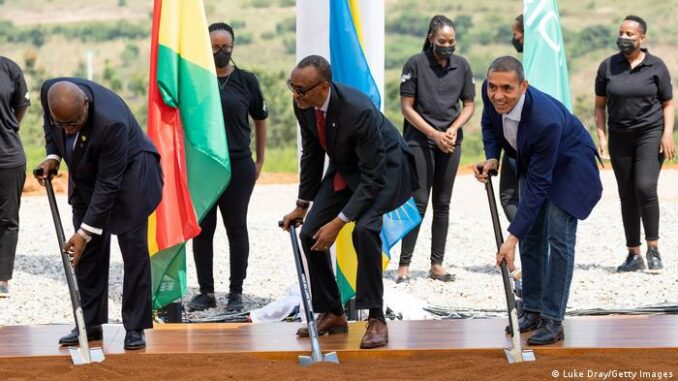
Africa’s first messenger RNA vaccine factory was inaugurated in Rwanda on Thursday, with the aim of producing treatments for Covid-19 and other diseases for millions of the continent’s inhabitants by early 2024.
The factory installed by the German pharmaceutical laboratory BioNTech in the Rwandan capital Kigali is the first of three planned on the African continent.
“This inauguration is a historic step towards equity in vaccines,” said Rwandan President Paul Kagame at a ceremony attended by the head of the World Health Organisation, Tedros Adhanom Ghebreyesus, the head of the African Union Commission, Moussa Faki Mahamat, and other senior officials.
Africa is the world’s least vaccinated continent against Covid-19, with less than 20% of its 1.2 billion people having received two doses of vaccine. The pandemic has revealed Africa’s huge dependence on imported vaccines and its technological backwardness compared to Europe, China and the United States. “The best way to tackle inequality is to put the tools in the hands of those who need them most,” said Tedros Adhanom Ghebreyesus.
BioNTech said it planned to employ about 100 Rwandans once the plant was operational and train them to make several new vaccines using the latest mRNA technology. “The idea is really that (…) vaccines for Africans should be produced on the African continent,” stressed BioNTech CEO Ugur Sahin.
He assured that the technology deployed in Rwanda – and later in factories in South Africa and Senegal – ensures that vaccines will be produced “with the same quality as anywhere else”. “Why shouldn’t Africans have access to the most modern and effective pharmaceutical products? There is no reason for this,” he added.
Production will include vaccines for Covid, but also pioneering treatments currently in development for malaria, tuberculosis and HIV, diseases that are taking their toll on Africa. Human trials of a BioNTech malaria vaccine using mRNA technology are expected to begin in late 2022.
